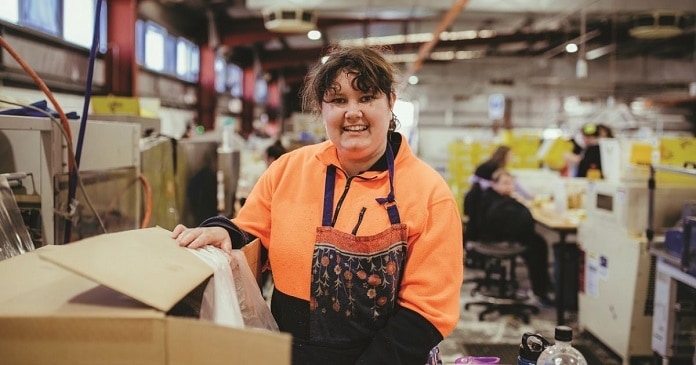Support workers at NDIS provider Bedford in South Australia struck in late May for two days, for wage equity and better treatment by management. In a separate dispute, Bedford workers with disabilities are also gearing up to win wage justice under a new agreement.
According to the Bedford website, it is “the second-largest employer for people with disability in Australia”, with “1300 clients across 18 sites in South Australia”.
Solidarity spoke with Dave Kirner, District Secretary of the CFMEU Manufacturing Division in SA, about the disputes.
Kirner explains: “In the case of the striking workers, it’s often tradespeople who are supervisors, who are working with people with the disabilities.”
The strikers are fighting to keep their wages up with inflation, but there’s also an equity issue with two awards in the workforce. “One’s the Social Community and Disability Services Award, and the other is the Supported Employment Services Award. And there’s a 25 per cent pay differential between those two awards.” Members on the lower paid award want to be paid the difference.
The strikers are also standing up against “a culture of bullying and intimidation against workers who are trying to have their say about how to improve the workplace … shifts in management have led to poor workplace culture that needs to be brought back to a more progressive workplace culture,” Kirner said.
Equal pay
The second dispute concerns workers on the Disability Support Pension. The ongoing federal Disability Royal Commission has shone a spotlight on their exploitation of at places like Bedford. These workers are “manufacturing or doing hospitality work, or making furniture or timber products, quite successfully. They’re distributed to places like Bunnings, they’re good quality products …
“We have shop stewards on the site. We have member meetings down there and people particularly want to get a CPI-based pay rise. But they also want some fundamental changes to the supportive wage assessment tools … In the main, people really want to have equal pay for equal work.”
The current tool for measuring productivity “often assesses you on things that aren’t really relevant to your work performance … If you tested an average person on it, they’d probably fail, but it’s used here to compress wages down,” Kirner said.
“The Fair Work Commission’s looking at introducing a new system, which will provide increases to the tune of up to 25 per cent in most cases for most workers with disability.
“The new wage tool will go part of the way, but then the dialogue has to take place about how do you actually get it to a point where people are paid the full minimum rate, and not discriminated against, because of their disability.
“A person on a disability [pension] who turns up for 38 hours a week and is paid $14 an hour is paid probably 40 per cent less than the minimum rate.
“There’s no reason why a government can’t fund the institutions that are providing that work to pay minimum wage rates in line with the rest of Australia.
“It’s been done for workers in that sector who don’t have a disability. There really is no reason why it can’t be done for workers in the sector with a disability.”
The bargaining period for workers with a disability begins on 1 August. At the time of writing, meetings were continuing about the support workers’ agreement, with further industrial action planned if there was no satisfactory outcome.
Supportive
The Fair Work Act outlaws workers with disabilities joining the support workers’ industrial action—yet another reason Solidarity argues this bad law needs to be broken.
“Workers with disabilities who have been supportive of workers taking industrial action have been asking the question of their unions about their rights to take industrial action in the negotiation of their next agreement. There is certainly interest among workers with disabilities in doing that.”
The dispute and Royal Commission have brought out many supporters. “We’ve had lots of people ringing up or emailing saying, can we help? Is this something we can do? And other unions have said that this is good, what’s going on? Why are people paid so low?”
So what can supporters do to help? “Get more involved in the debates and the discussions. If you are a carer or a parent or a family member of a worker with a disability, feel free to contact a union to talk about people becoming union members.
“And we’ve got a lot more parents now saying they want to get involved in the collective bargaining debates and discussions. And they’re also talking about how do we have the debate about getting our kids into open employment with some of the Australian companies that are offering a full wage.
“We go down to these sites and we see how hard people work, how committed they are, how switched on they are, what a great job they do. No matter their circumstances, they shouldn’t be paid less than anybody else.”
By Robert Stainsby






